University of Business: COVID-19 Impact on Sales Growth of Toyota
VerifiedAdded on 2023/06/10
|12
|2723
|462
Report
AI Summary
This research report examines the impact of the COVID-19 pandemic on the sales growth of Toyota. The report begins with a clear research aim and objectives, followed by a detailed explanation of the chosen methodology, which includes a deductive research approach, a descriptive research design, and a quantitative research method. The study focuses on survey data collection from participants above 20 years of age, collected from Toyota. The report also addresses ethical considerations, including respect for autonomy, scientific integrity, social responsibility, maximizing benefit, minimizing harm, and confidentiality. Key sections include the research aim, objectives, methodology, and ethical considerations, supported by a comprehensive reference list and an appendix with a research ethics checklist. The research aims to analyze the challenges faced by Toyota, the strategies employed, and the impact of COVID-19 on the supply and demand dynamics of the car market, providing valuable insights into business performance during a global crisis. The report is a valuable resource for understanding the effects of external factors on business performance.
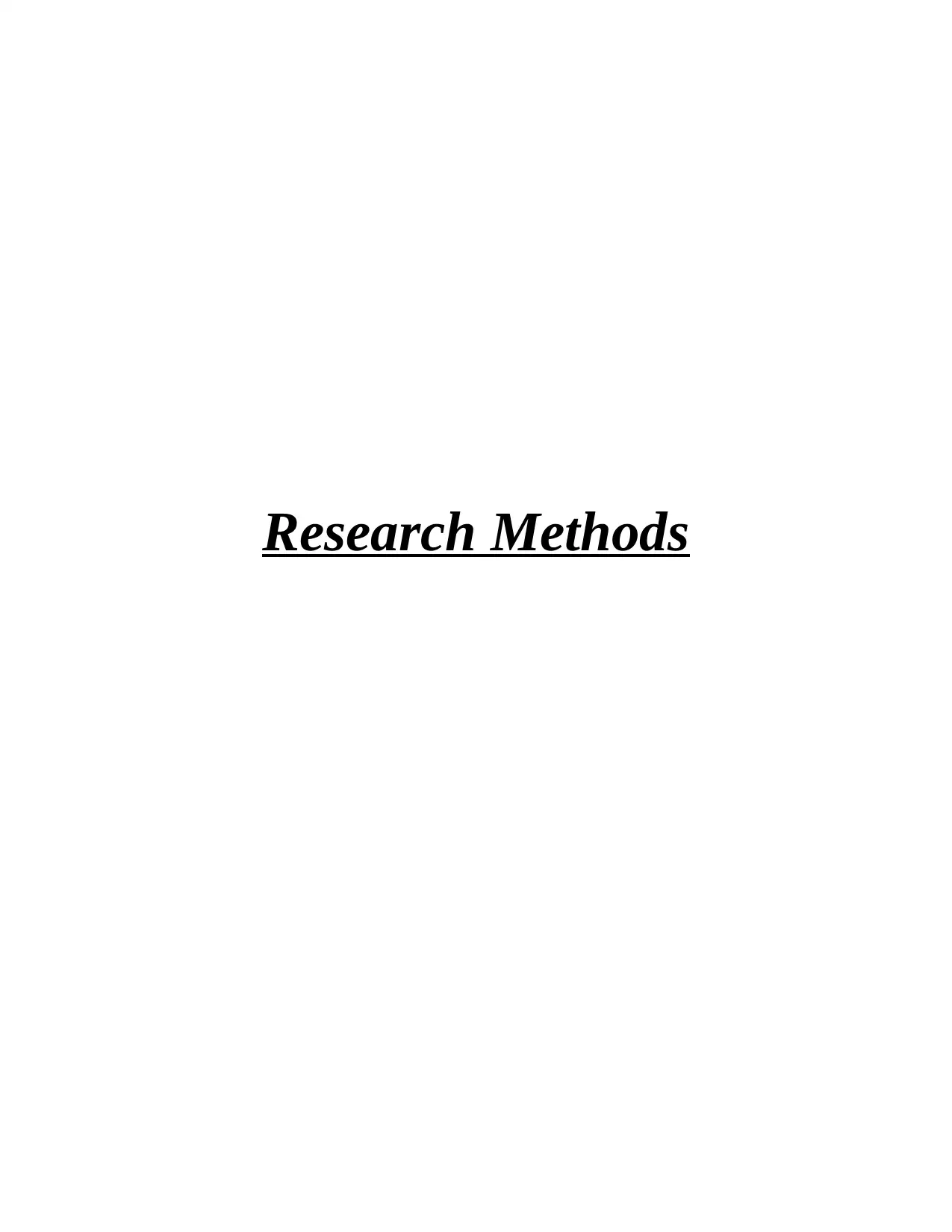
Research Methods
Paraphrase This Document
Need a fresh take? Get an instant paraphrase of this document with our AI Paraphraser
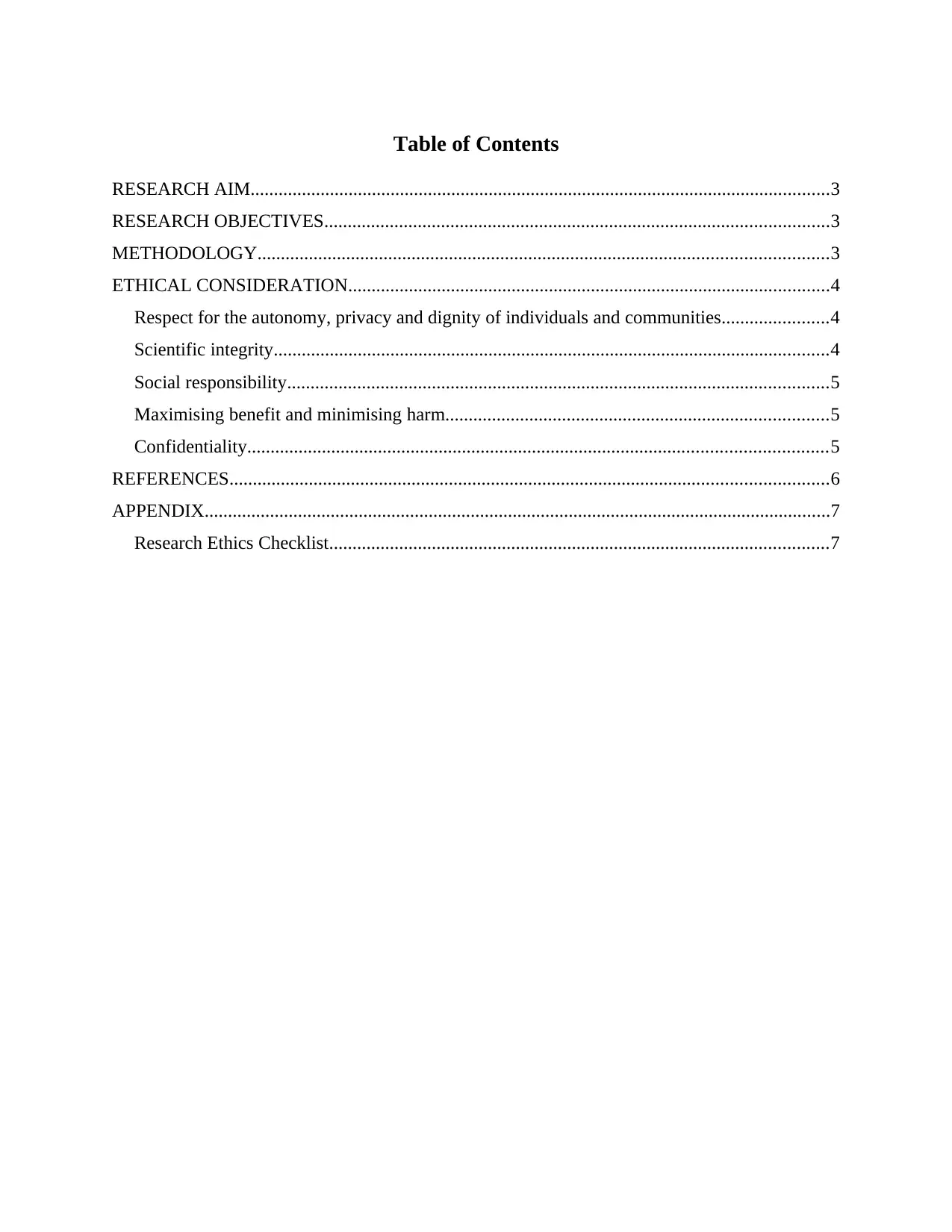
Table of Contents
RESEARCH AIM............................................................................................................................3
RESEARCH OBJECTIVES............................................................................................................3
METHODOLOGY..........................................................................................................................3
ETHICAL CONSIDERATION.......................................................................................................4
Respect for the autonomy, privacy and dignity of individuals and communities.......................4
Scientific integrity.......................................................................................................................4
Social responsibility....................................................................................................................5
Maximising benefit and minimising harm..................................................................................5
Confidentiality............................................................................................................................5
REFERENCES................................................................................................................................6
APPENDIX......................................................................................................................................7
Research Ethics Checklist...........................................................................................................7
RESEARCH AIM............................................................................................................................3
RESEARCH OBJECTIVES............................................................................................................3
METHODOLOGY..........................................................................................................................3
ETHICAL CONSIDERATION.......................................................................................................4
Respect for the autonomy, privacy and dignity of individuals and communities.......................4
Scientific integrity.......................................................................................................................4
Social responsibility....................................................................................................................5
Maximising benefit and minimising harm..................................................................................5
Confidentiality............................................................................................................................5
REFERENCES................................................................................................................................6
APPENDIX......................................................................................................................................7
Research Ethics Checklist...........................................................................................................7
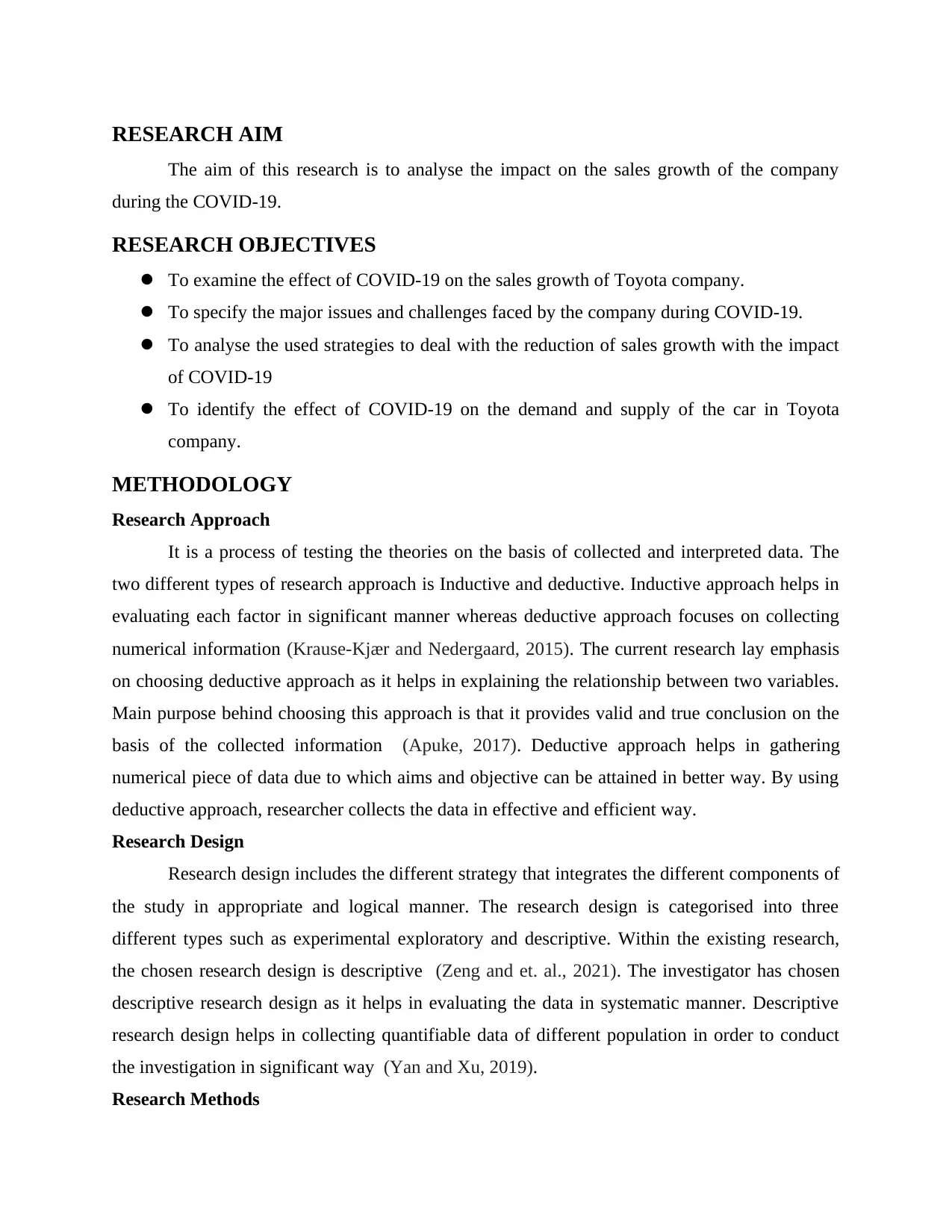
RESEARCH AIM
The aim of this research is to analyse the impact on the sales growth of the company
during the COVID-19.
RESEARCH OBJECTIVES
To examine the effect of COVID-19 on the sales growth of Toyota company.
To specify the major issues and challenges faced by the company during COVID-19.
To analyse the used strategies to deal with the reduction of sales growth with the impact
of COVID-19
To identify the effect of COVID-19 on the demand and supply of the car in Toyota
company.
METHODOLOGY
Research Approach
It is a process of testing the theories on the basis of collected and interpreted data. The
two different types of research approach is Inductive and deductive. Inductive approach helps in
evaluating each factor in significant manner whereas deductive approach focuses on collecting
numerical information (Krause-Kjær and Nedergaard, 2015). The current research lay emphasis
on choosing deductive approach as it helps in explaining the relationship between two variables.
Main purpose behind choosing this approach is that it provides valid and true conclusion on the
basis of the collected information (Apuke, 2017). Deductive approach helps in gathering
numerical piece of data due to which aims and objective can be attained in better way. By using
deductive approach, researcher collects the data in effective and efficient way.
Research Design
Research design includes the different strategy that integrates the different components of
the study in appropriate and logical manner. The research design is categorised into three
different types such as experimental exploratory and descriptive. Within the existing research,
the chosen research design is descriptive (Zeng and et. al., 2021). The investigator has chosen
descriptive research design as it helps in evaluating the data in systematic manner. Descriptive
research design helps in collecting quantifiable data of different population in order to conduct
the investigation in significant way (Yan and Xu, 2019).
Research Methods
The aim of this research is to analyse the impact on the sales growth of the company
during the COVID-19.
RESEARCH OBJECTIVES
To examine the effect of COVID-19 on the sales growth of Toyota company.
To specify the major issues and challenges faced by the company during COVID-19.
To analyse the used strategies to deal with the reduction of sales growth with the impact
of COVID-19
To identify the effect of COVID-19 on the demand and supply of the car in Toyota
company.
METHODOLOGY
Research Approach
It is a process of testing the theories on the basis of collected and interpreted data. The
two different types of research approach is Inductive and deductive. Inductive approach helps in
evaluating each factor in significant manner whereas deductive approach focuses on collecting
numerical information (Krause-Kjær and Nedergaard, 2015). The current research lay emphasis
on choosing deductive approach as it helps in explaining the relationship between two variables.
Main purpose behind choosing this approach is that it provides valid and true conclusion on the
basis of the collected information (Apuke, 2017). Deductive approach helps in gathering
numerical piece of data due to which aims and objective can be attained in better way. By using
deductive approach, researcher collects the data in effective and efficient way.
Research Design
Research design includes the different strategy that integrates the different components of
the study in appropriate and logical manner. The research design is categorised into three
different types such as experimental exploratory and descriptive. Within the existing research,
the chosen research design is descriptive (Zeng and et. al., 2021). The investigator has chosen
descriptive research design as it helps in evaluating the data in systematic manner. Descriptive
research design helps in collecting quantifiable data of different population in order to conduct
the investigation in significant way (Yan and Xu, 2019).
Research Methods
⊘ This is a preview!⊘
Do you want full access?
Subscribe today to unlock all pages.

Trusted by 1+ million students worldwide
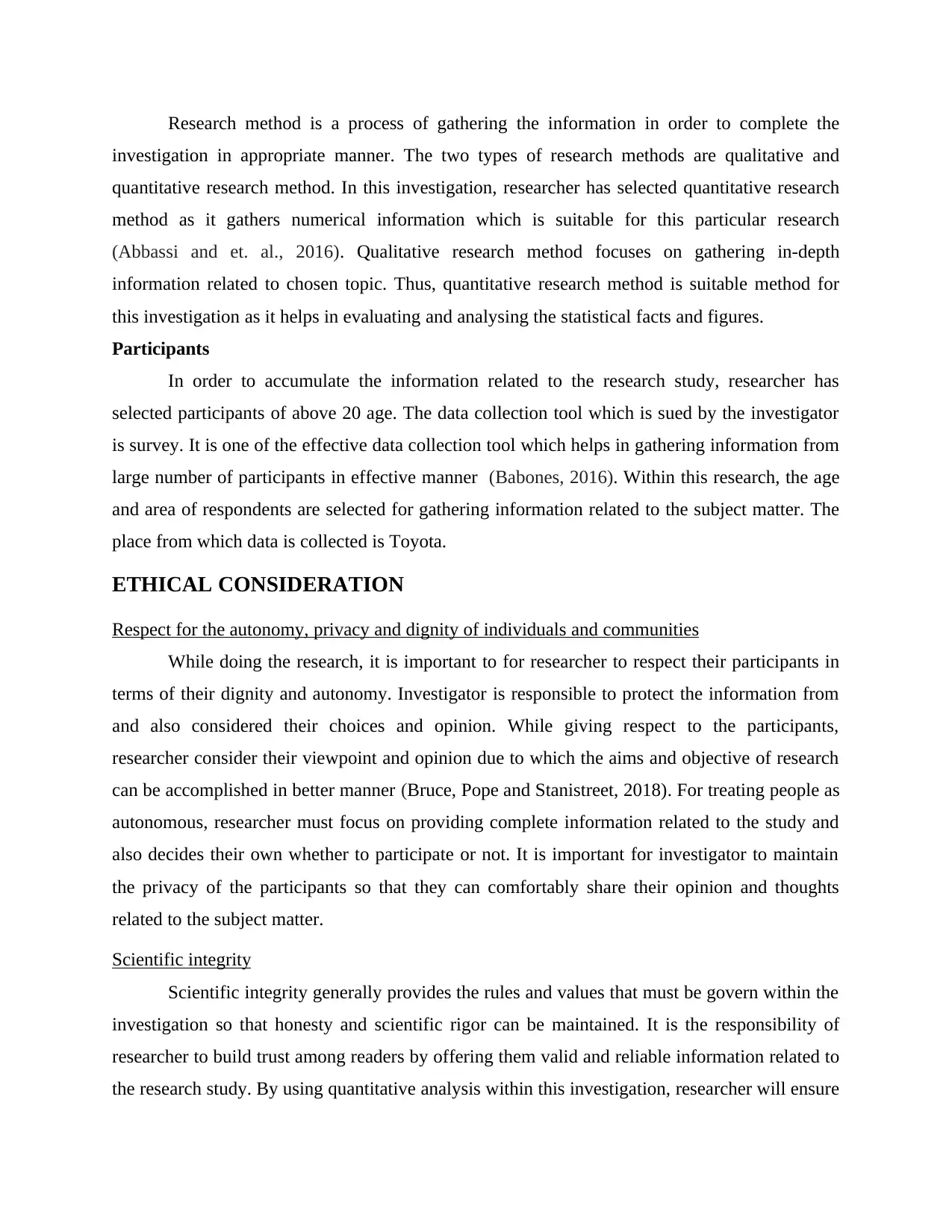
Research method is a process of gathering the information in order to complete the
investigation in appropriate manner. The two types of research methods are qualitative and
quantitative research method. In this investigation, researcher has selected quantitative research
method as it gathers numerical information which is suitable for this particular research
(Abbassi and et. al., 2016). Qualitative research method focuses on gathering in-depth
information related to chosen topic. Thus, quantitative research method is suitable method for
this investigation as it helps in evaluating and analysing the statistical facts and figures.
Participants
In order to accumulate the information related to the research study, researcher has
selected participants of above 20 age. The data collection tool which is sued by the investigator
is survey. It is one of the effective data collection tool which helps in gathering information from
large number of participants in effective manner (Babones, 2016). Within this research, the age
and area of respondents are selected for gathering information related to the subject matter. The
place from which data is collected is Toyota.
ETHICAL CONSIDERATION
Respect for the autonomy, privacy and dignity of individuals and communities
While doing the research, it is important to for researcher to respect their participants in
terms of their dignity and autonomy. Investigator is responsible to protect the information from
and also considered their choices and opinion. While giving respect to the participants,
researcher consider their viewpoint and opinion due to which the aims and objective of research
can be accomplished in better manner (Bruce, Pope and Stanistreet, 2018). For treating people as
autonomous, researcher must focus on providing complete information related to the study and
also decides their own whether to participate or not. It is important for investigator to maintain
the privacy of the participants so that they can comfortably share their opinion and thoughts
related to the subject matter.
Scientific integrity
Scientific integrity generally provides the rules and values that must be govern within the
investigation so that honesty and scientific rigor can be maintained. It is the responsibility of
researcher to build trust among readers by offering them valid and reliable information related to
the research study. By using quantitative analysis within this investigation, researcher will ensure
investigation in appropriate manner. The two types of research methods are qualitative and
quantitative research method. In this investigation, researcher has selected quantitative research
method as it gathers numerical information which is suitable for this particular research
(Abbassi and et. al., 2016). Qualitative research method focuses on gathering in-depth
information related to chosen topic. Thus, quantitative research method is suitable method for
this investigation as it helps in evaluating and analysing the statistical facts and figures.
Participants
In order to accumulate the information related to the research study, researcher has
selected participants of above 20 age. The data collection tool which is sued by the investigator
is survey. It is one of the effective data collection tool which helps in gathering information from
large number of participants in effective manner (Babones, 2016). Within this research, the age
and area of respondents are selected for gathering information related to the subject matter. The
place from which data is collected is Toyota.
ETHICAL CONSIDERATION
Respect for the autonomy, privacy and dignity of individuals and communities
While doing the research, it is important to for researcher to respect their participants in
terms of their dignity and autonomy. Investigator is responsible to protect the information from
and also considered their choices and opinion. While giving respect to the participants,
researcher consider their viewpoint and opinion due to which the aims and objective of research
can be accomplished in better manner (Bruce, Pope and Stanistreet, 2018). For treating people as
autonomous, researcher must focus on providing complete information related to the study and
also decides their own whether to participate or not. It is important for investigator to maintain
the privacy of the participants so that they can comfortably share their opinion and thoughts
related to the subject matter.
Scientific integrity
Scientific integrity generally provides the rules and values that must be govern within the
investigation so that honesty and scientific rigor can be maintained. It is the responsibility of
researcher to build trust among readers by offering them valid and reliable information related to
the research study. By using quantitative analysis within this investigation, researcher will ensure
Paraphrase This Document
Need a fresh take? Get an instant paraphrase of this document with our AI Paraphraser
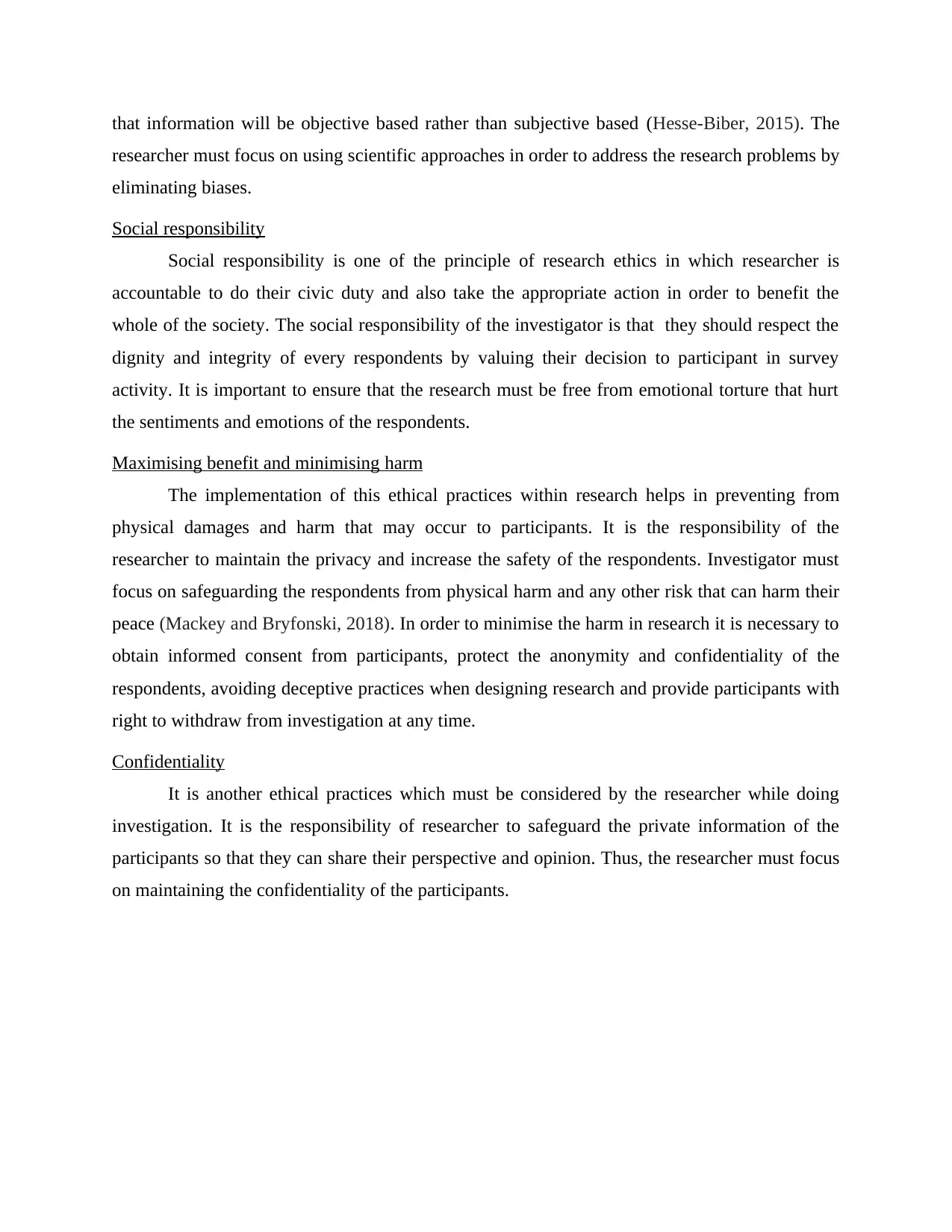
that information will be objective based rather than subjective based (Hesse-Biber, 2015). The
researcher must focus on using scientific approaches in order to address the research problems by
eliminating biases.
Social responsibility
Social responsibility is one of the principle of research ethics in which researcher is
accountable to do their civic duty and also take the appropriate action in order to benefit the
whole of the society. The social responsibility of the investigator is that they should respect the
dignity and integrity of every respondents by valuing their decision to participant in survey
activity. It is important to ensure that the research must be free from emotional torture that hurt
the sentiments and emotions of the respondents.
Maximising benefit and minimising harm
The implementation of this ethical practices within research helps in preventing from
physical damages and harm that may occur to participants. It is the responsibility of the
researcher to maintain the privacy and increase the safety of the respondents. Investigator must
focus on safeguarding the respondents from physical harm and any other risk that can harm their
peace (Mackey and Bryfonski, 2018). In order to minimise the harm in research it is necessary to
obtain informed consent from participants, protect the anonymity and confidentiality of the
respondents, avoiding deceptive practices when designing research and provide participants with
right to withdraw from investigation at any time.
Confidentiality
It is another ethical practices which must be considered by the researcher while doing
investigation. It is the responsibility of researcher to safeguard the private information of the
participants so that they can share their perspective and opinion. Thus, the researcher must focus
on maintaining the confidentiality of the participants.
researcher must focus on using scientific approaches in order to address the research problems by
eliminating biases.
Social responsibility
Social responsibility is one of the principle of research ethics in which researcher is
accountable to do their civic duty and also take the appropriate action in order to benefit the
whole of the society. The social responsibility of the investigator is that they should respect the
dignity and integrity of every respondents by valuing their decision to participant in survey
activity. It is important to ensure that the research must be free from emotional torture that hurt
the sentiments and emotions of the respondents.
Maximising benefit and minimising harm
The implementation of this ethical practices within research helps in preventing from
physical damages and harm that may occur to participants. It is the responsibility of the
researcher to maintain the privacy and increase the safety of the respondents. Investigator must
focus on safeguarding the respondents from physical harm and any other risk that can harm their
peace (Mackey and Bryfonski, 2018). In order to minimise the harm in research it is necessary to
obtain informed consent from participants, protect the anonymity and confidentiality of the
respondents, avoiding deceptive practices when designing research and provide participants with
right to withdraw from investigation at any time.
Confidentiality
It is another ethical practices which must be considered by the researcher while doing
investigation. It is the responsibility of researcher to safeguard the private information of the
participants so that they can share their perspective and opinion. Thus, the researcher must focus
on maintaining the confidentiality of the participants.
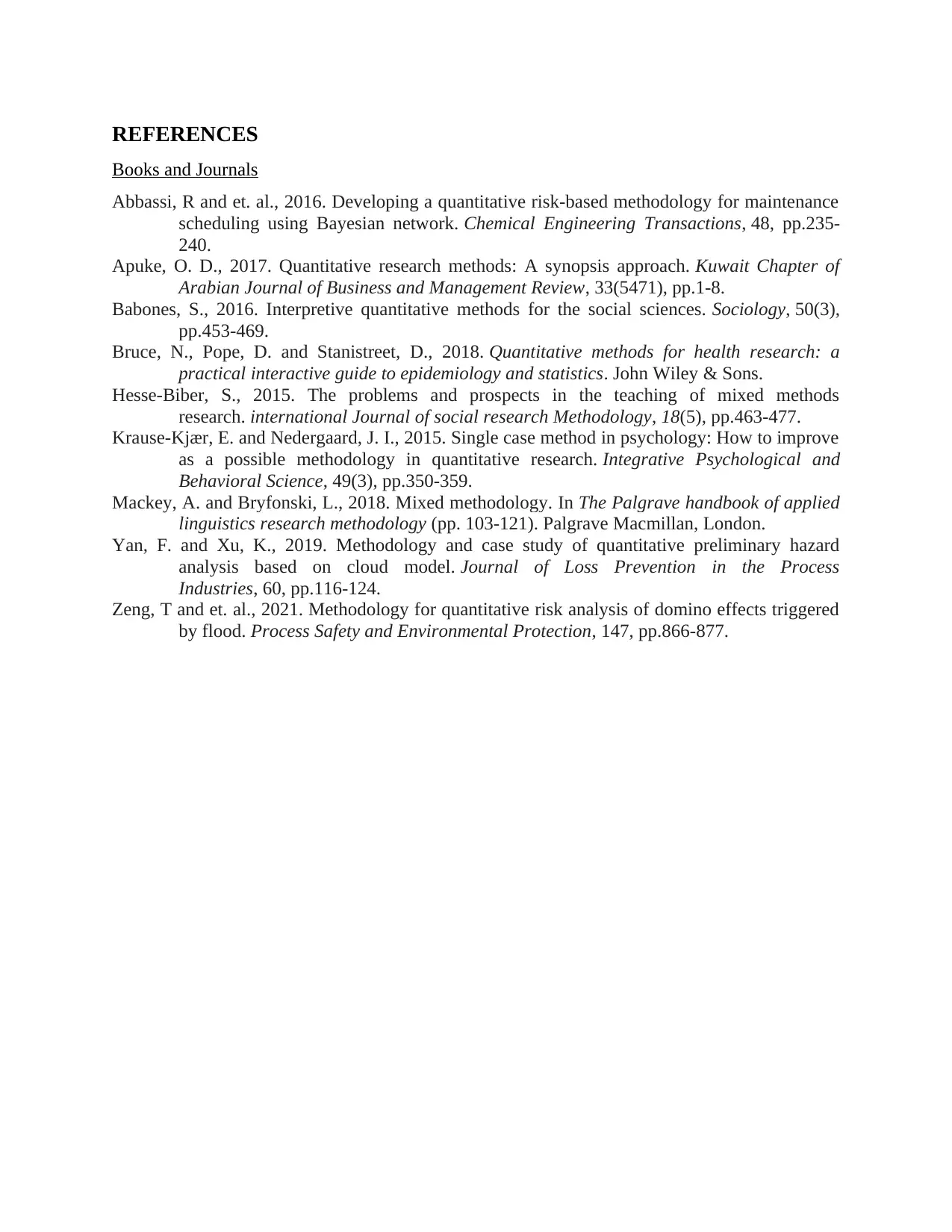
REFERENCES
Books and Journals
Abbassi, R and et. al., 2016. Developing a quantitative risk-based methodology for maintenance
scheduling using Bayesian network. Chemical Engineering Transactions, 48, pp.235-
240.
Apuke, O. D., 2017. Quantitative research methods: A synopsis approach. Kuwait Chapter of
Arabian Journal of Business and Management Review, 33(5471), pp.1-8.
Babones, S., 2016. Interpretive quantitative methods for the social sciences. Sociology, 50(3),
pp.453-469.
Bruce, N., Pope, D. and Stanistreet, D., 2018. Quantitative methods for health research: a
practical interactive guide to epidemiology and statistics. John Wiley & Sons.
Hesse-Biber, S., 2015. The problems and prospects in the teaching of mixed methods
research. international Journal of social research Methodology, 18(5), pp.463-477.
Krause-Kjær, E. and Nedergaard, J. I., 2015. Single case method in psychology: How to improve
as a possible methodology in quantitative research. Integrative Psychological and
Behavioral Science, 49(3), pp.350-359.
Mackey, A. and Bryfonski, L., 2018. Mixed methodology. In The Palgrave handbook of applied
linguistics research methodology (pp. 103-121). Palgrave Macmillan, London.
Yan, F. and Xu, K., 2019. Methodology and case study of quantitative preliminary hazard
analysis based on cloud model. Journal of Loss Prevention in the Process
Industries, 60, pp.116-124.
Zeng, T and et. al., 2021. Methodology for quantitative risk analysis of domino effects triggered
by flood. Process Safety and Environmental Protection, 147, pp.866-877.
Books and Journals
Abbassi, R and et. al., 2016. Developing a quantitative risk-based methodology for maintenance
scheduling using Bayesian network. Chemical Engineering Transactions, 48, pp.235-
240.
Apuke, O. D., 2017. Quantitative research methods: A synopsis approach. Kuwait Chapter of
Arabian Journal of Business and Management Review, 33(5471), pp.1-8.
Babones, S., 2016. Interpretive quantitative methods for the social sciences. Sociology, 50(3),
pp.453-469.
Bruce, N., Pope, D. and Stanistreet, D., 2018. Quantitative methods for health research: a
practical interactive guide to epidemiology and statistics. John Wiley & Sons.
Hesse-Biber, S., 2015. The problems and prospects in the teaching of mixed methods
research. international Journal of social research Methodology, 18(5), pp.463-477.
Krause-Kjær, E. and Nedergaard, J. I., 2015. Single case method in psychology: How to improve
as a possible methodology in quantitative research. Integrative Psychological and
Behavioral Science, 49(3), pp.350-359.
Mackey, A. and Bryfonski, L., 2018. Mixed methodology. In The Palgrave handbook of applied
linguistics research methodology (pp. 103-121). Palgrave Macmillan, London.
Yan, F. and Xu, K., 2019. Methodology and case study of quantitative preliminary hazard
analysis based on cloud model. Journal of Loss Prevention in the Process
Industries, 60, pp.116-124.
Zeng, T and et. al., 2021. Methodology for quantitative risk analysis of domino effects triggered
by flood. Process Safety and Environmental Protection, 147, pp.866-877.
⊘ This is a preview!⊘
Do you want full access?
Subscribe today to unlock all pages.

Trusted by 1+ million students worldwide
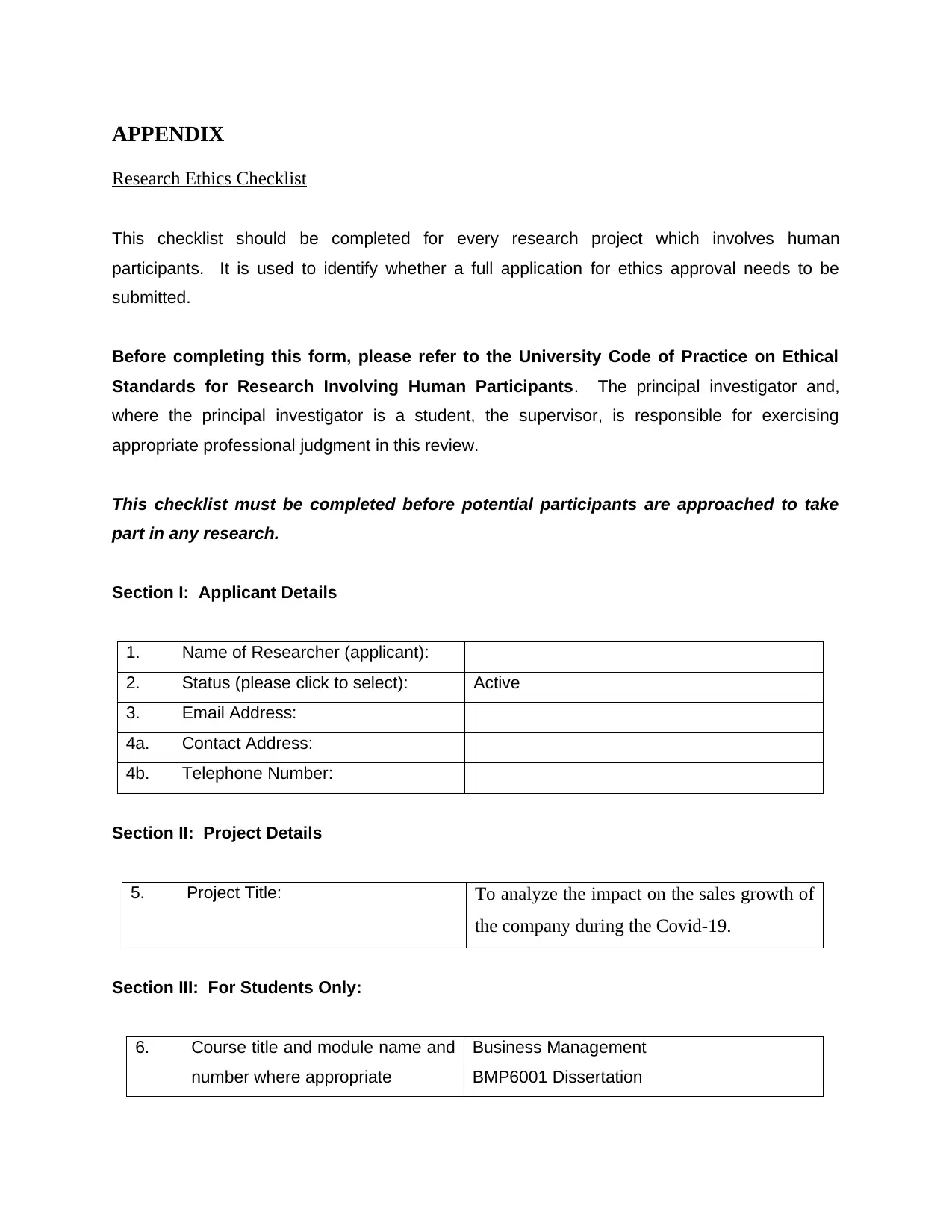
APPENDIX
Research Ethics Checklist
This checklist should be completed for every research project which involves human
participants. It is used to identify whether a full application for ethics approval needs to be
submitted.
Before completing this form, please refer to the University Code of Practice on Ethical
Standards for Research Involving Human Participants. The principal investigator and,
where the principal investigator is a student, the supervisor, is responsible for exercising
appropriate professional judgment in this review.
This checklist must be completed before potential participants are approached to take
part in any research.
Section I: Applicant Details
1. Name of Researcher (applicant):
2. Status (please click to select): Active
3. Email Address:
4a. Contact Address:
4b. Telephone Number:
Section II: Project Details
5. Project Title: To analyze the impact on the sales growth of
the company during the Covid-19.
Section III: For Students Only:
6. Course title and module name and
number where appropriate
Business Management
BMP6001 Dissertation
Research Ethics Checklist
This checklist should be completed for every research project which involves human
participants. It is used to identify whether a full application for ethics approval needs to be
submitted.
Before completing this form, please refer to the University Code of Practice on Ethical
Standards for Research Involving Human Participants. The principal investigator and,
where the principal investigator is a student, the supervisor, is responsible for exercising
appropriate professional judgment in this review.
This checklist must be completed before potential participants are approached to take
part in any research.
Section I: Applicant Details
1. Name of Researcher (applicant):
2. Status (please click to select): Active
3. Email Address:
4a. Contact Address:
4b. Telephone Number:
Section II: Project Details
5. Project Title: To analyze the impact on the sales growth of
the company during the Covid-19.
Section III: For Students Only:
6. Course title and module name and
number where appropriate
Business Management
BMP6001 Dissertation
Paraphrase This Document
Need a fresh take? Get an instant paraphrase of this document with our AI Paraphraser
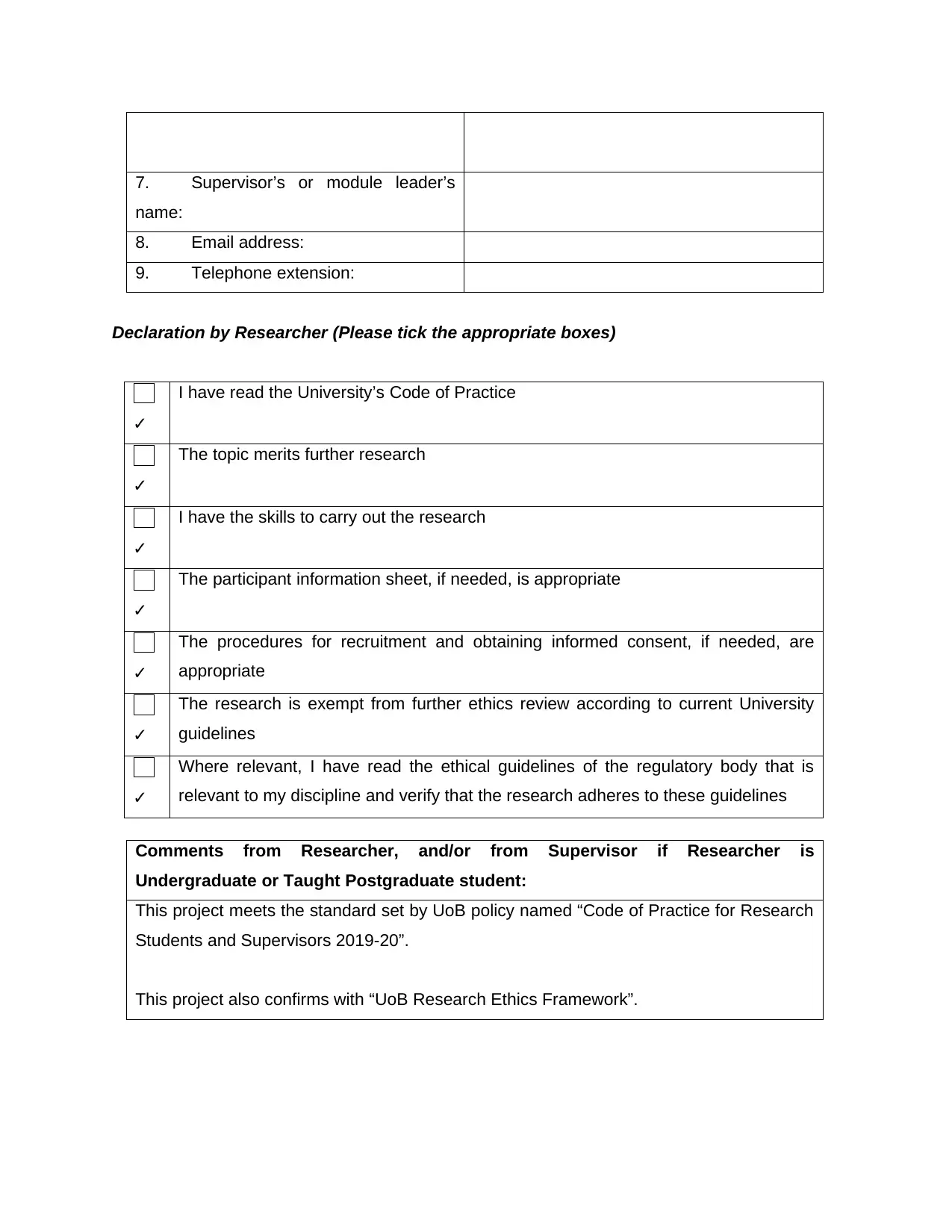
7. Supervisor’s or module leader’s
name:
8. Email address:
9. Telephone extension:
Declaration by Researcher (Please tick the appropriate boxes)
✓
I have read the University’s Code of Practice
✓
The topic merits further research
✓
I have the skills to carry out the research
✓
The participant information sheet, if needed, is appropriate
✓
The procedures for recruitment and obtaining informed consent, if needed, are
appropriate
✓
The research is exempt from further ethics review according to current University
guidelines
✓
Where relevant, I have read the ethical guidelines of the regulatory body that is
relevant to my discipline and verify that the research adheres to these guidelines
Comments from Researcher, and/or from Supervisor if Researcher is
Undergraduate or Taught Postgraduate student:
This project meets the standard set by UoB policy named “Code of Practice for Research
Students and Supervisors 2019-20”.
This project also confirms with “UoB Research Ethics Framework”.
name:
8. Email address:
9. Telephone extension:
Declaration by Researcher (Please tick the appropriate boxes)
✓
I have read the University’s Code of Practice
✓
The topic merits further research
✓
I have the skills to carry out the research
✓
The participant information sheet, if needed, is appropriate
✓
The procedures for recruitment and obtaining informed consent, if needed, are
appropriate
✓
The research is exempt from further ethics review according to current University
guidelines
✓
Where relevant, I have read the ethical guidelines of the regulatory body that is
relevant to my discipline and verify that the research adheres to these guidelines
Comments from Researcher, and/or from Supervisor if Researcher is
Undergraduate or Taught Postgraduate student:
This project meets the standard set by UoB policy named “Code of Practice for Research
Students and Supervisors 2019-20”.
This project also confirms with “UoB Research Ethics Framework”.
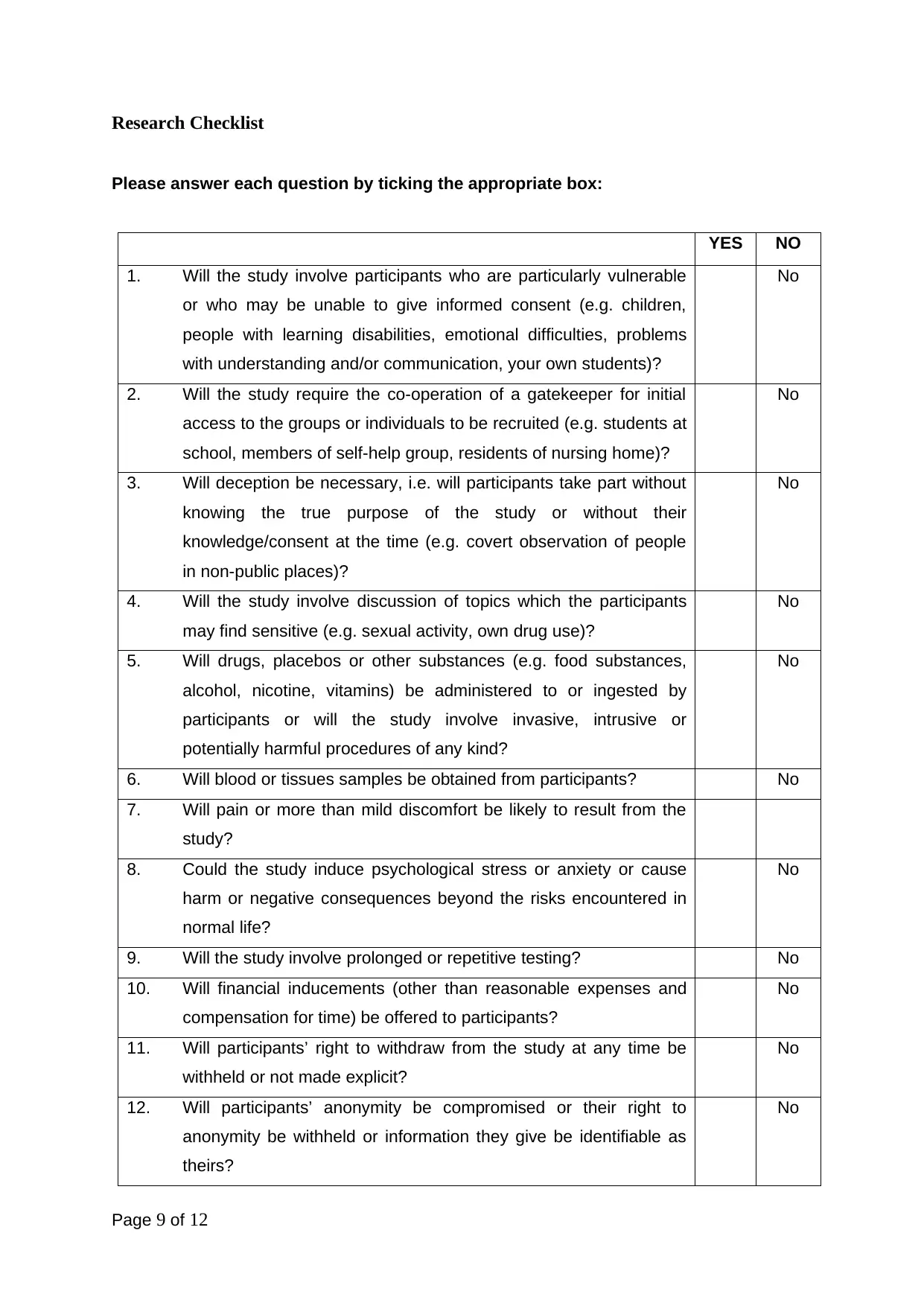
Research Checklist
Please answer each question by ticking the appropriate box:
YES NO
1. Will the study involve participants who are particularly vulnerable
or who may be unable to give informed consent (e.g. children,
people with learning disabilities, emotional difficulties, problems
with understanding and/or communication, your own students)?
No
2. Will the study require the co-operation of a gatekeeper for initial
access to the groups or individuals to be recruited (e.g. students at
school, members of self-help group, residents of nursing home)?
No
3. Will deception be necessary, i.e. will participants take part without
knowing the true purpose of the study or without their
knowledge/consent at the time (e.g. covert observation of people
in non-public places)?
No
4. Will the study involve discussion of topics which the participants
may find sensitive (e.g. sexual activity, own drug use)?
No
5. Will drugs, placebos or other substances (e.g. food substances,
alcohol, nicotine, vitamins) be administered to or ingested by
participants or will the study involve invasive, intrusive or
potentially harmful procedures of any kind?
No
6. Will blood or tissues samples be obtained from participants? No
7. Will pain or more than mild discomfort be likely to result from the
study?
8. Could the study induce psychological stress or anxiety or cause
harm or negative consequences beyond the risks encountered in
normal life?
No
9. Will the study involve prolonged or repetitive testing? No
10. Will financial inducements (other than reasonable expenses and
compensation for time) be offered to participants?
No
11. Will participants’ right to withdraw from the study at any time be
withheld or not made explicit?
No
12. Will participants’ anonymity be compromised or their right to
anonymity be withheld or information they give be identifiable as
theirs?
No
Page 9 of 12
Please answer each question by ticking the appropriate box:
YES NO
1. Will the study involve participants who are particularly vulnerable
or who may be unable to give informed consent (e.g. children,
people with learning disabilities, emotional difficulties, problems
with understanding and/or communication, your own students)?
No
2. Will the study require the co-operation of a gatekeeper for initial
access to the groups or individuals to be recruited (e.g. students at
school, members of self-help group, residents of nursing home)?
No
3. Will deception be necessary, i.e. will participants take part without
knowing the true purpose of the study or without their
knowledge/consent at the time (e.g. covert observation of people
in non-public places)?
No
4. Will the study involve discussion of topics which the participants
may find sensitive (e.g. sexual activity, own drug use)?
No
5. Will drugs, placebos or other substances (e.g. food substances,
alcohol, nicotine, vitamins) be administered to or ingested by
participants or will the study involve invasive, intrusive or
potentially harmful procedures of any kind?
No
6. Will blood or tissues samples be obtained from participants? No
7. Will pain or more than mild discomfort be likely to result from the
study?
8. Could the study induce psychological stress or anxiety or cause
harm or negative consequences beyond the risks encountered in
normal life?
No
9. Will the study involve prolonged or repetitive testing? No
10. Will financial inducements (other than reasonable expenses and
compensation for time) be offered to participants?
No
11. Will participants’ right to withdraw from the study at any time be
withheld or not made explicit?
No
12. Will participants’ anonymity be compromised or their right to
anonymity be withheld or information they give be identifiable as
theirs?
No
Page 9 of 12
⊘ This is a preview!⊘
Do you want full access?
Subscribe today to unlock all pages.

Trusted by 1+ million students worldwide
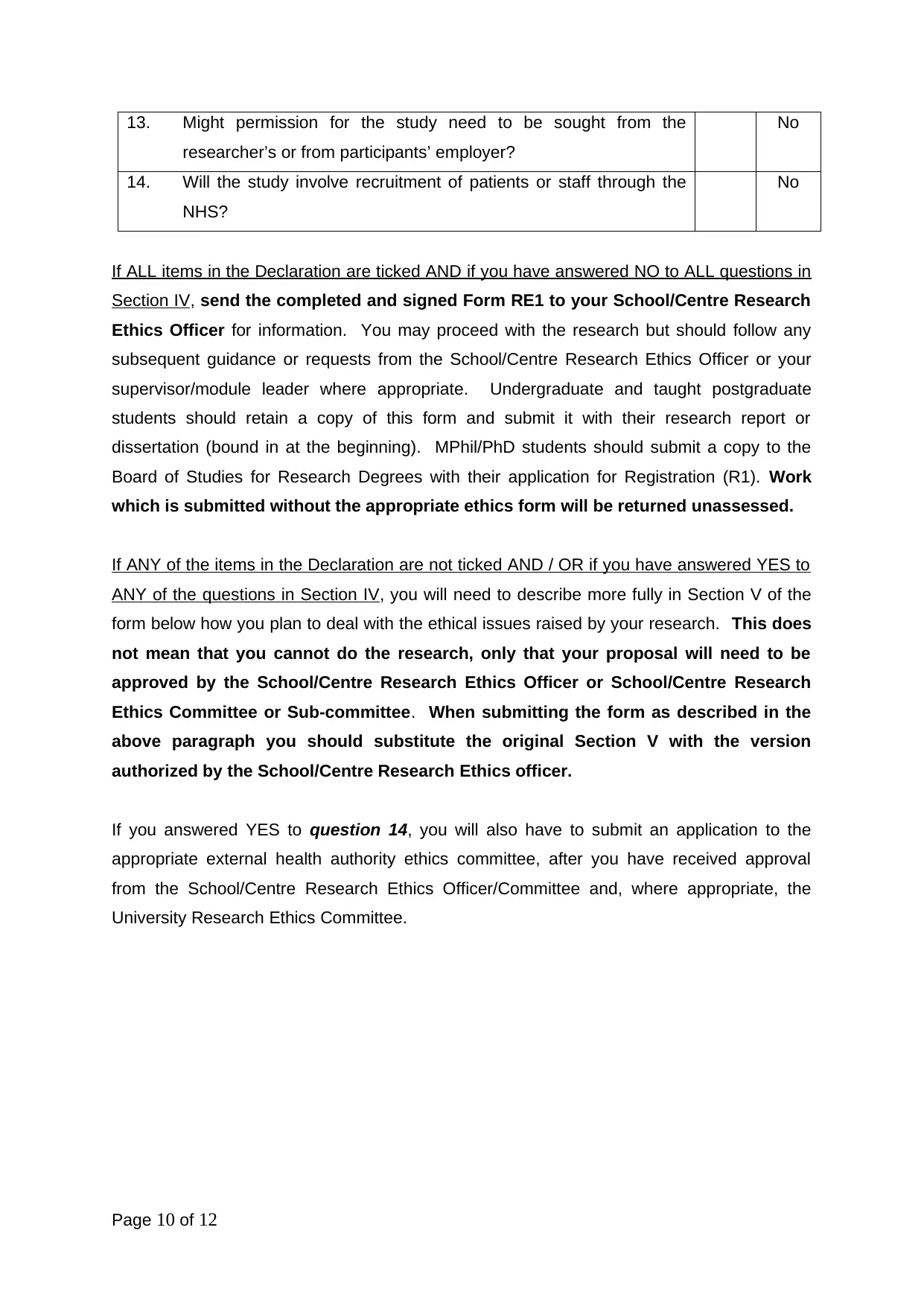
13. Might permission for the study need to be sought from the
researcher’s or from participants’ employer?
No
14. Will the study involve recruitment of patients or staff through the
NHS?
No
If ALL items in the Declaration are ticked AND if you have answered NO to ALL questions in
Section IV, send the completed and signed Form RE1 to your School/Centre Research
Ethics Officer for information. You may proceed with the research but should follow any
subsequent guidance or requests from the School/Centre Research Ethics Officer or your
supervisor/module leader where appropriate. Undergraduate and taught postgraduate
students should retain a copy of this form and submit it with their research report or
dissertation (bound in at the beginning). MPhil/PhD students should submit a copy to the
Board of Studies for Research Degrees with their application for Registration (R1). Work
which is submitted without the appropriate ethics form will be returned unassessed.
If ANY of the items in the Declaration are not ticked AND / OR if you have answered YES to
ANY of the questions in Section IV, you will need to describe more fully in Section V of the
form below how you plan to deal with the ethical issues raised by your research. This does
not mean that you cannot do the research, only that your proposal will need to be
approved by the School/Centre Research Ethics Officer or School/Centre Research
Ethics Committee or Sub-committee. When submitting the form as described in the
above paragraph you should substitute the original Section V with the version
authorized by the School/Centre Research Ethics officer.
If you answered YES to question 14, you will also have to submit an application to the
appropriate external health authority ethics committee, after you have received approval
from the School/Centre Research Ethics Officer/Committee and, where appropriate, the
University Research Ethics Committee.
Page 10 of 12
researcher’s or from participants’ employer?
No
14. Will the study involve recruitment of patients or staff through the
NHS?
No
If ALL items in the Declaration are ticked AND if you have answered NO to ALL questions in
Section IV, send the completed and signed Form RE1 to your School/Centre Research
Ethics Officer for information. You may proceed with the research but should follow any
subsequent guidance or requests from the School/Centre Research Ethics Officer or your
supervisor/module leader where appropriate. Undergraduate and taught postgraduate
students should retain a copy of this form and submit it with their research report or
dissertation (bound in at the beginning). MPhil/PhD students should submit a copy to the
Board of Studies for Research Degrees with their application for Registration (R1). Work
which is submitted without the appropriate ethics form will be returned unassessed.
If ANY of the items in the Declaration are not ticked AND / OR if you have answered YES to
ANY of the questions in Section IV, you will need to describe more fully in Section V of the
form below how you plan to deal with the ethical issues raised by your research. This does
not mean that you cannot do the research, only that your proposal will need to be
approved by the School/Centre Research Ethics Officer or School/Centre Research
Ethics Committee or Sub-committee. When submitting the form as described in the
above paragraph you should substitute the original Section V with the version
authorized by the School/Centre Research Ethics officer.
If you answered YES to question 14, you will also have to submit an application to the
appropriate external health authority ethics committee, after you have received approval
from the School/Centre Research Ethics Officer/Committee and, where appropriate, the
University Research Ethics Committee.
Page 10 of 12
Paraphrase This Document
Need a fresh take? Get an instant paraphrase of this document with our AI Paraphraser
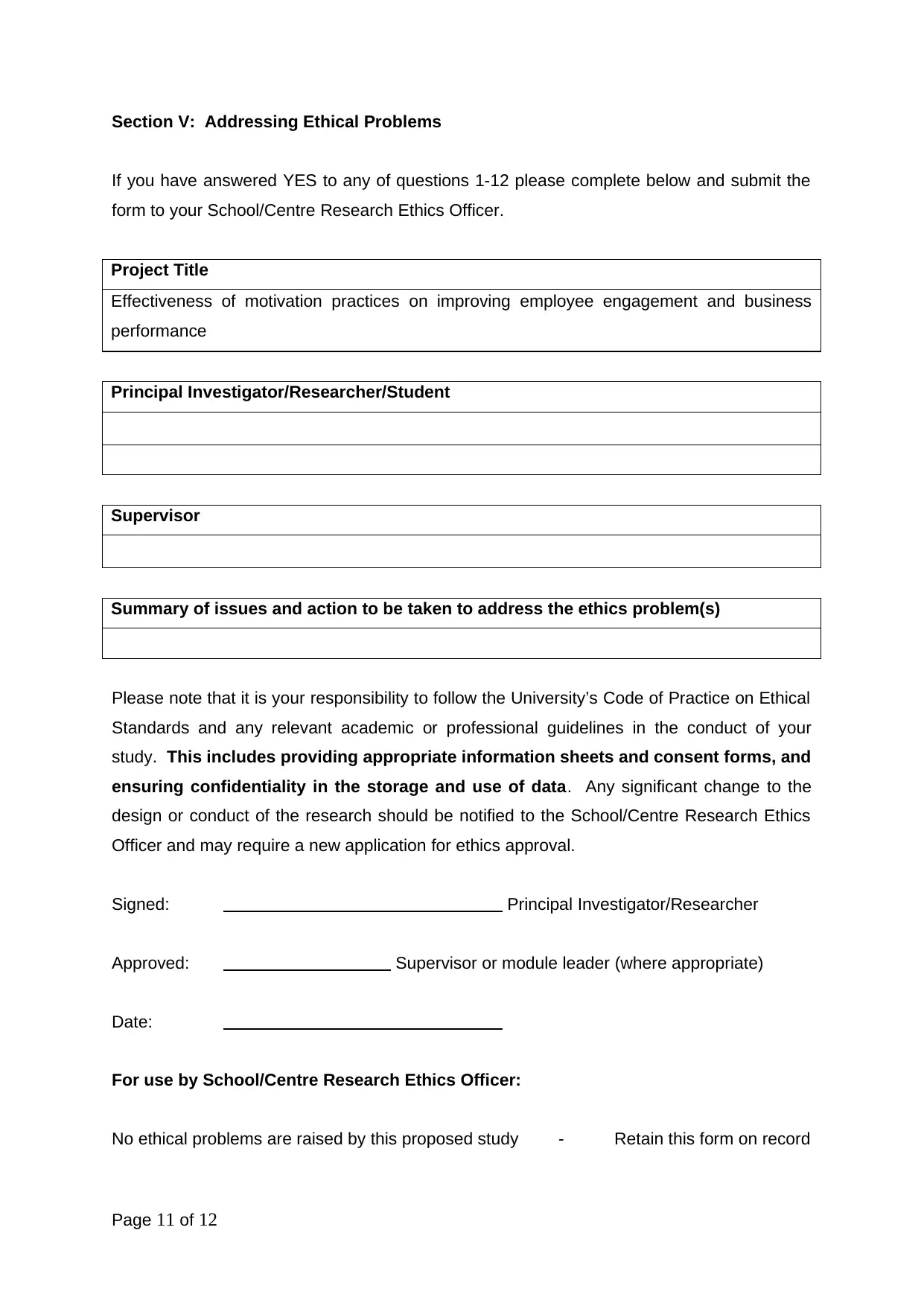
Section V: Addressing Ethical Problems
If you have answered YES to any of questions 1-12 please complete below and submit the
form to your School/Centre Research Ethics Officer.
Project Title
Effectiveness of motivation practices on improving employee engagement and business
performance
Principal Investigator/Researcher/Student
Supervisor
Summary of issues and action to be taken to address the ethics problem(s)
Please note that it is your responsibility to follow the University’s Code of Practice on Ethical
Standards and any relevant academic or professional guidelines in the conduct of your
study. This includes providing appropriate information sheets and consent forms, and
ensuring confidentiality in the storage and use of data. Any significant change to the
design or conduct of the research should be notified to the School/Centre Research Ethics
Officer and may require a new application for ethics approval.
Signed: Principal Investigator/Researcher
Approved: Supervisor or module leader (where appropriate)
Date:
For use by School/Centre Research Ethics Officer:
No ethical problems are raised by this proposed study - Retain this form on record
Page 11 of 12
If you have answered YES to any of questions 1-12 please complete below and submit the
form to your School/Centre Research Ethics Officer.
Project Title
Effectiveness of motivation practices on improving employee engagement and business
performance
Principal Investigator/Researcher/Student
Supervisor
Summary of issues and action to be taken to address the ethics problem(s)
Please note that it is your responsibility to follow the University’s Code of Practice on Ethical
Standards and any relevant academic or professional guidelines in the conduct of your
study. This includes providing appropriate information sheets and consent forms, and
ensuring confidentiality in the storage and use of data. Any significant change to the
design or conduct of the research should be notified to the School/Centre Research Ethics
Officer and may require a new application for ethics approval.
Signed: Principal Investigator/Researcher
Approved: Supervisor or module leader (where appropriate)
Date:
For use by School/Centre Research Ethics Officer:
No ethical problems are raised by this proposed study - Retain this form on record
Page 11 of 12
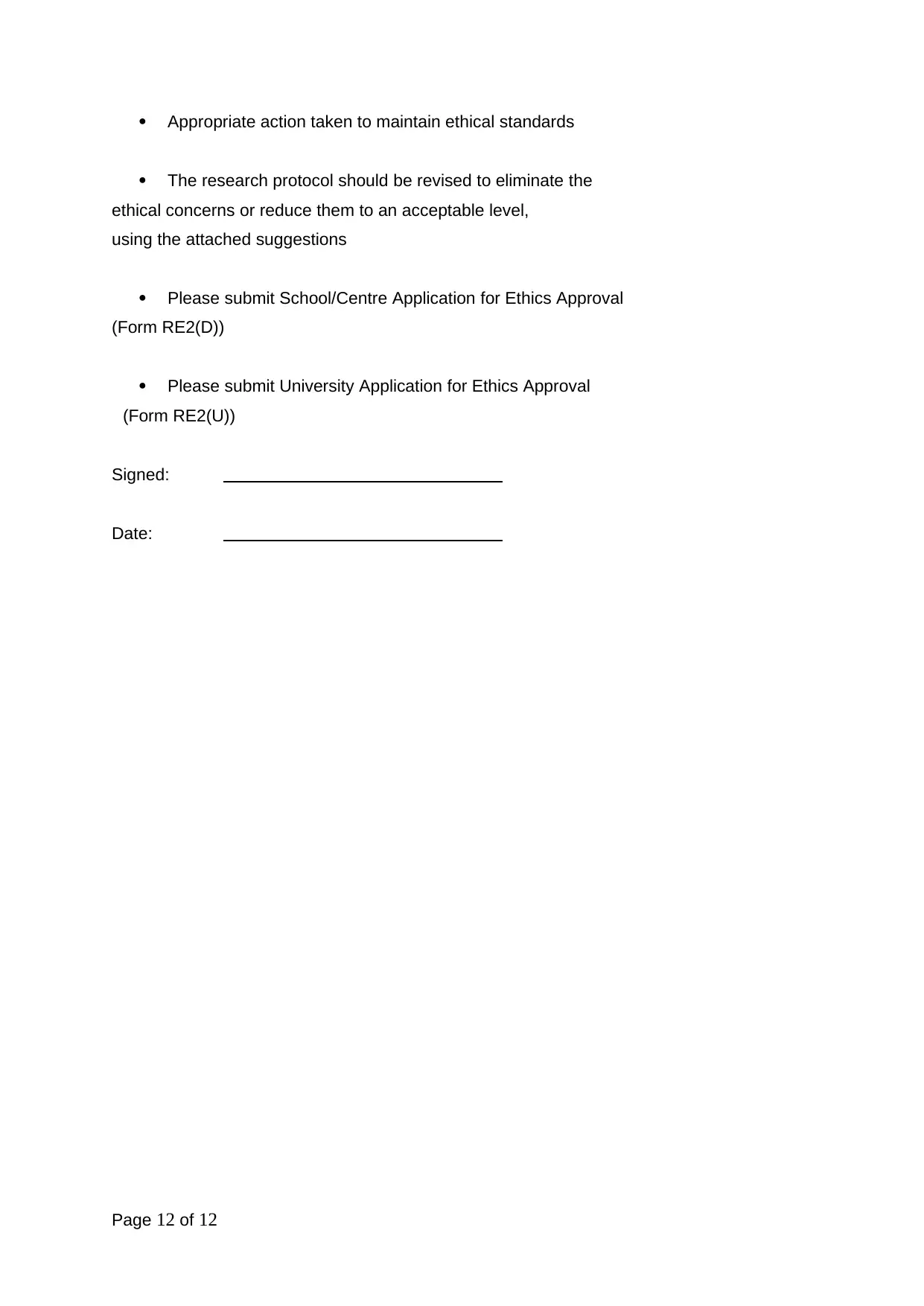
Appropriate action taken to maintain ethical standards
The research protocol should be revised to eliminate the
ethical concerns or reduce them to an acceptable level,
using the attached suggestions
Please submit School/Centre Application for Ethics Approval
(Form RE2(D))
Please submit University Application for Ethics Approval
(Form RE2(U))
Signed:
Date:
Page 12 of 12
The research protocol should be revised to eliminate the
ethical concerns or reduce them to an acceptable level,
using the attached suggestions
Please submit School/Centre Application for Ethics Approval
(Form RE2(D))
Please submit University Application for Ethics Approval
(Form RE2(U))
Signed:
Date:
Page 12 of 12
⊘ This is a preview!⊘
Do you want full access?
Subscribe today to unlock all pages.

Trusted by 1+ million students worldwide
1 out of 12
Related Documents
Your All-in-One AI-Powered Toolkit for Academic Success.
+13062052269
info@desklib.com
Available 24*7 on WhatsApp / Email
![[object Object]](/_next/static/media/star-bottom.7253800d.svg)
Unlock your academic potential
Copyright © 2020–2026 A2Z Services. All Rights Reserved. Developed and managed by ZUCOL.



